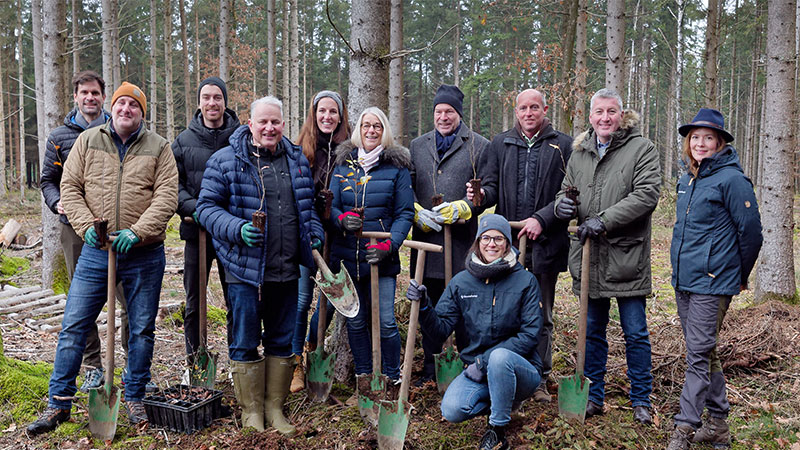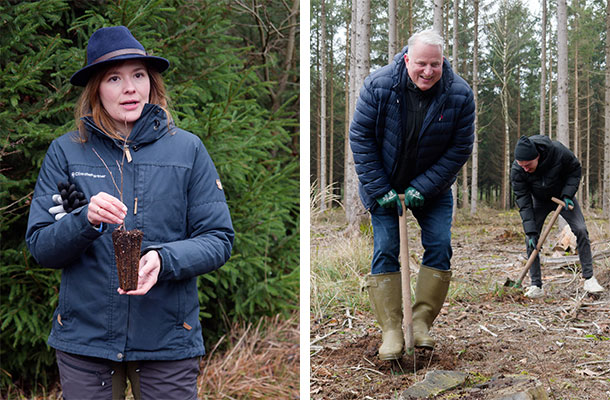Cheers to Forest Conservation
December 13, 2022Munich's “Wiesnwirte” (the hosts of the Oktoberfest beer tents), the Schutzgemeinschaft Deutscher Wald (a German forest protection organisation), and ClimatePartner are contributing to forest conservation in Munich's surrounding area. The goal is to convert the current pure spruce stock into a more climate-resistant mixed deciduous forest.

The participants of the forest protection project (l.t.r.): Jan Schüssler (ClimatePartner), Sebastian Kuffler, Konstantin Schottenhamel, Christian Schottenhamel, Kathrin Wickenhäuser-Egger, Susanne Geimann, Michael Schottenhamel, Katharina Kammers (ClimatePartner), Thomas Luff, Christian Luff, Helena Scholz (ClimatePartner)
© Helmut Swoboda
The regional forest protection project started at the end of November with a tree planting event in Deisenhofer Forest, south of Munich. Equipped with spades and thick winter clothing, the Oktoberfest hosts together with a team from ClimatePartner and representatives of the Schutzgemeinschaft Deutscher Wald planted red beech seedlings. A total of 20 seedlings were planted on this first day of the project, and 1300 are to be planted over the course of the next year. The addition of new trees among the native spruce stock is intended to adapt the forests in the Munich area to climate change, because a more diverse plant mix will be more stable in changing climatic conditions.
The project is embedded in the climate action commitment of the Munich Wiesnwirte. Together with ClimatePartner, the beer tent hosts have calculated the emissions of their tent operations, from the Steins of beer and the roast chickens to the electricity consumption. The Oktoberfest tents are continuously reducing these emissions, for example by using green electricity, choosing local suppliers, and offering more and more meat-free dishes.
Depending on the size of their remaining carbon footprint, the hosts support certified carbon offset projects that save the equivalent amount of emissions elsewhere in the world. For example, in one supported forest conservation project in Colombia, 1,150,200 hectares of tropical rainforest are being saved from deforestation, thus preserving biodiversity. The project also provides education, healthcare, sanitation, food security and other benefits to the local population. As a result of the offset emissions, the beer tent operation is considered carbon neutral.

l.t.r. Helena Scholz (ClimatePartner), Christian Schottenhamel and Konstantin Schottenhamel
© Helmut Swoboda
In addition to measuring, reducing, and offsetting the emissions of the tent operation, the Wiesnwirte also want to get involved in regional climate action. For this reason, they finance the planting of one tree in the surrounding area of Munich for every ton of CO2 emitted by their beer tent operations. So far, the Schottenhamel, Käfer Wiesn-Schänke, Fischer Vroni, Kufflers Weinzelt, Münchner Stubn, Poschner's, and Schützenlisl tents are participating in the project. Maybe next year there will even be a few more.